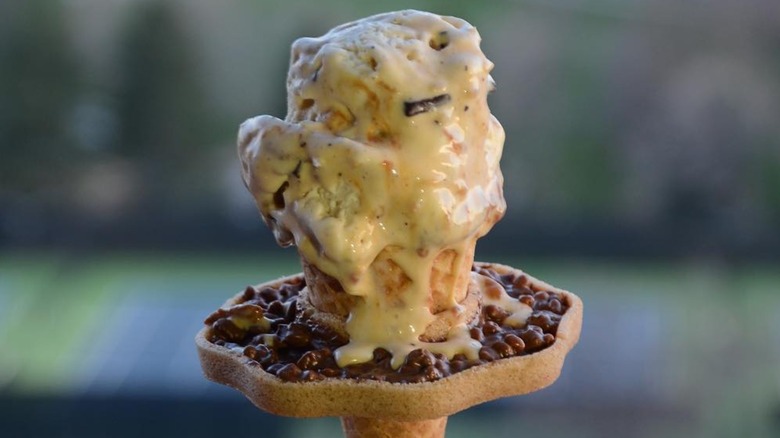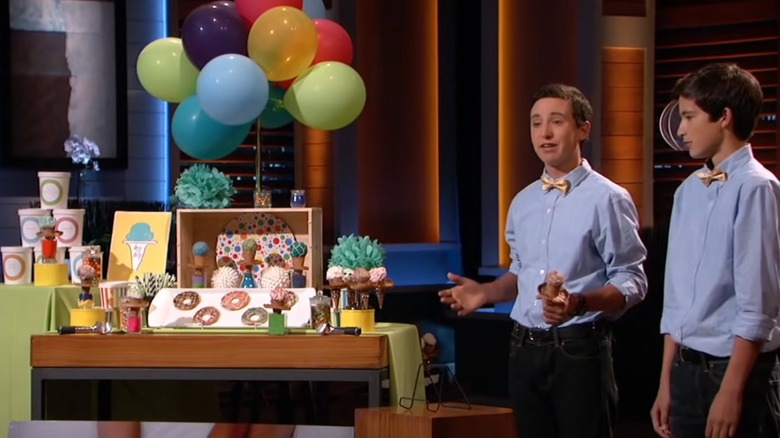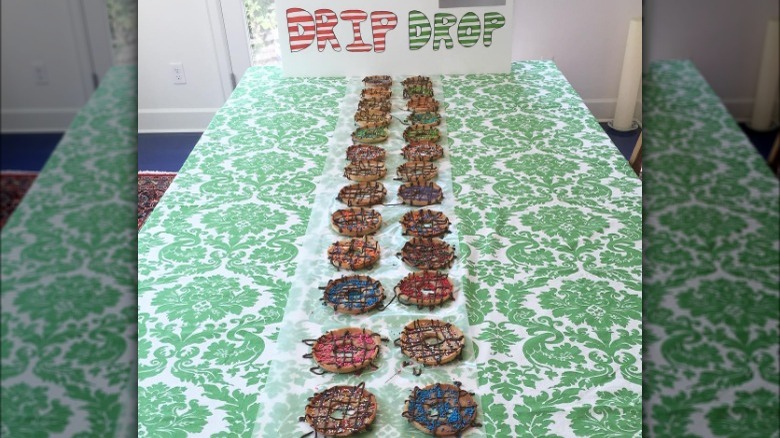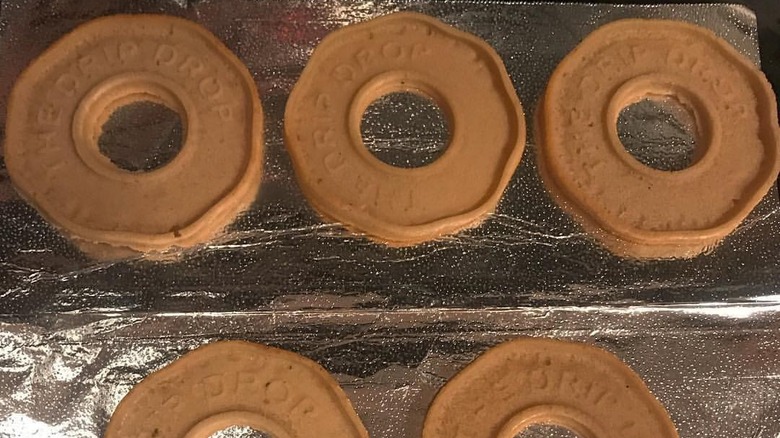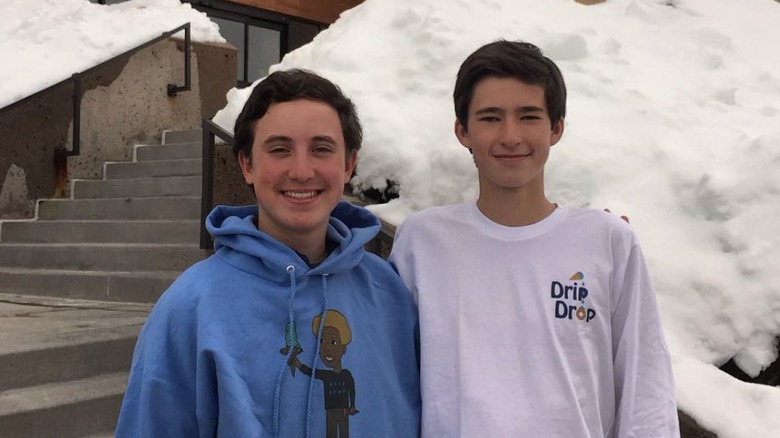The Drip Drop: Here's What Happened After Shark Tank
In 2011, when they were both 10-years-old, childhood friends Oliver Greenwald and Sam Nassif invented The Drip Drop to solve a common problem plaguing children like them: melting ice cream. The Drip Drop is an edible waffle cone ring that acts like a shelf to catch liquified remnants and falling sprinkles while also shielding hands from the sticky mess. It easily slides on and off pointy-tipped cones, like sugar and waffle varieties, enabling ice cream lovers of all ages to enjoy the frozen treat mess-free and get a bonus donut-shaped cookie ring to devour at the end.
The duo was inspired to create The Drip Drop after a chance encounter at a local ice cream parlor in their hometown of Denver, Colorado. As they witnessed a mother try to clean up her young child, covered from head to toe in the frozen dessert, the two had a lightbulb moment. Using just cookie batter and a toaster oven, Greenwald and Nassif created their homemade prototypes and, once perfected, entered the design into their elementary school's Gates Invention and Innovations competition, winning second place as well as gaining funding to patent their invention.
From the design's origins in 2011 to their "Shark Tank" appearance in 2016, during Season 7, Episode 25, Greenwald and Nassif had grown up and were high school freshmen when they came to the show. Even so, they were still the youngest contestants to enter the Tank without an adult, making their pitch among one of the most impressive during the show's 15 seasons.
What happened to The Drip Drop on Shark Tank?
Adorning matching outfits, Oliver Greenwald and Sam Nassif entered the Tank to pitch The Drip Drop to Barbara Corcoran, Mark Cuban, Kevin O'Leary, Lori Greiner, and Robert Herjavec. They sought a $50,000 investment for 20% equity, hoping a deal would lead to licensing opportunities. With a framed design patent in hand, which Greenwald jokingly called a "chick magnet," the inventors initially had the Sharks cheering and laughing as they enjoyed their ice cream cones.
The Sharks seemed eager to offer the teens marketing advice, but ultimately, the most critical among them actually thought the product was worthy of an investment. Despite pointing out design flaws and complaining about the homemade look, Corcoran presented the offer to meet the investment ask of $50,000, but for a greater 33% share of The Drip Drop. But, there was a caveat. Corcoran's offer was contingent on Greenwald and Nassif rectifying the design flaws and improving the quality of the product before the deal would be finalized. After a brief huddle, the teens happily accepted the offer, causing the other Sharks to erupt with applause and cheers.
Although four Sharks passed on the investment, each took to social media to broadcast their support following the episode's airing. O'Leary posted on X, "Nothing I love than seeing young entrepreneurs with heart & hustle!! They're the future of this country's economy!" Similarly, Greiner tweeted on X, "Who needs a driver's license when you can have a patent? Lol."
The Drip Drop after Shark Tank
Although things looked promising for Oliver Greenwald and Sam Nassif when Barbara Corcoran signed on, the deal fell apart after "Shark Tank" aired, for undisclosed reasons. Without Corcoran's $50,000 investment, The Drip Drop was cash-poor and in need of new investors. Riding the company's exposure from "Shark Tank," the teens then took to Kickstarter to keep the business afloat. The campaign ran from August to September 2018, generating $7,047 from 82 backers and surpassing an initial goal of $7,000.
A majority of the funds came from an anonymous donor, pledging to fill the gap if the company could secure $4,000. With those funds, Greenwald and Nassif purchased new baking pans, incorporating the wavy edge Corcoran suggested and also bearing the company's name. As promised, 300 revamped Drip Drops were shipped to backers across the U.S., along with stickers and other swag to express appreciation. Although this was a win for the company, their momentum was about to stall again.
According to a 2019 interview with The Denver Post, Greenwald and Nassif parted ways shortly after their Kickstarter campaign. Nassif personally invested $2,500 in The Drip Drop, but Greenwald couldn't match it, so he cashed out. Although this was a tough time, Nassif continued with his business plan, hoping to secure a licensing agreement with ice cream cone manufacturers.
Did The Drip Drop go out of business?
With the help of friends, Sam Nassif continued to churn out the improved product using his former school's kitchen as his manufacturing center. He tweaked The Drip Drop recipe, making it a sugar cone and crispy vanilla cookie hybrid. He secured deals with three Denver-area businesses, hoping to make The Drip Drop the next ice cream parlor staple. Nassif charged $0.99 for plain designs and $1.25 for chocolate-drizzled versions. By June 2019, less than a year after the Kickstarter wrapped up, 1,200 Drip Drops were sold.
According to a 2019 article published in the University of Pennsylvania's Wharton Global Youth Program, Nassif said, "We've been contacted by Joy Cone, the No. 1 cone manufacturer in the world." But, at the same time he was trying to broker a licensing deal with the company, Nassif and his former partner, Oliver Greenwald, were graduating from high school, complicating things further.
With plans to attend college in the fall, there seemed to be too many barriers for The Drip Drop to succeed. Nassif enrolled in Chapman University to study entrepreneurship and business, and Greenwald headed Duke, pursuing a computer science degree. The company's Instagram account had its last post on July 21, 2019, and The Drip Drop's website has also since shut down.
What's next for The Drip Drop's founders?
According to Sam Nassif's LinkedIn page, he's been very busy since The Drip Drop folded in 2019. After receiving a bachelor's degree in business administration from Chapman University, he has continued to create opportunities for himself, founding PeerWise LLC, a mobile app designed to help college communities foster social networks, and Loyee.ai, artificial intelligence software used to help businesses target potential customers. Although PeerWise doesn't seem to be in business anymore, Loyee's website is operational, listing locations in Munich, Germany, and Silicon Valley, California. In February 2024, Nassif took a job in New York City as an operations associate at Techstars, a seed firm that invests in other companies.
Oliver Greenwald currently lives in Toyko, Japan, and has enjoyed his own impressive developments. According to his LinkedIn page, Greenwald graduated from Duke University in 2023 with a bachelor's degree in arts and minors in computer science and human interaction design and psychology. While at college, he founded MSH (Make S*** Happen), an app that inspires people to get involved by tasking them with five-minute social change assignments. Since 2023, Greenwald has worked at The Digital Architecture Lab as a community designer, where he focuses on "developing a new digital sensibility suited for our future's challenging but pro-social scenario."

